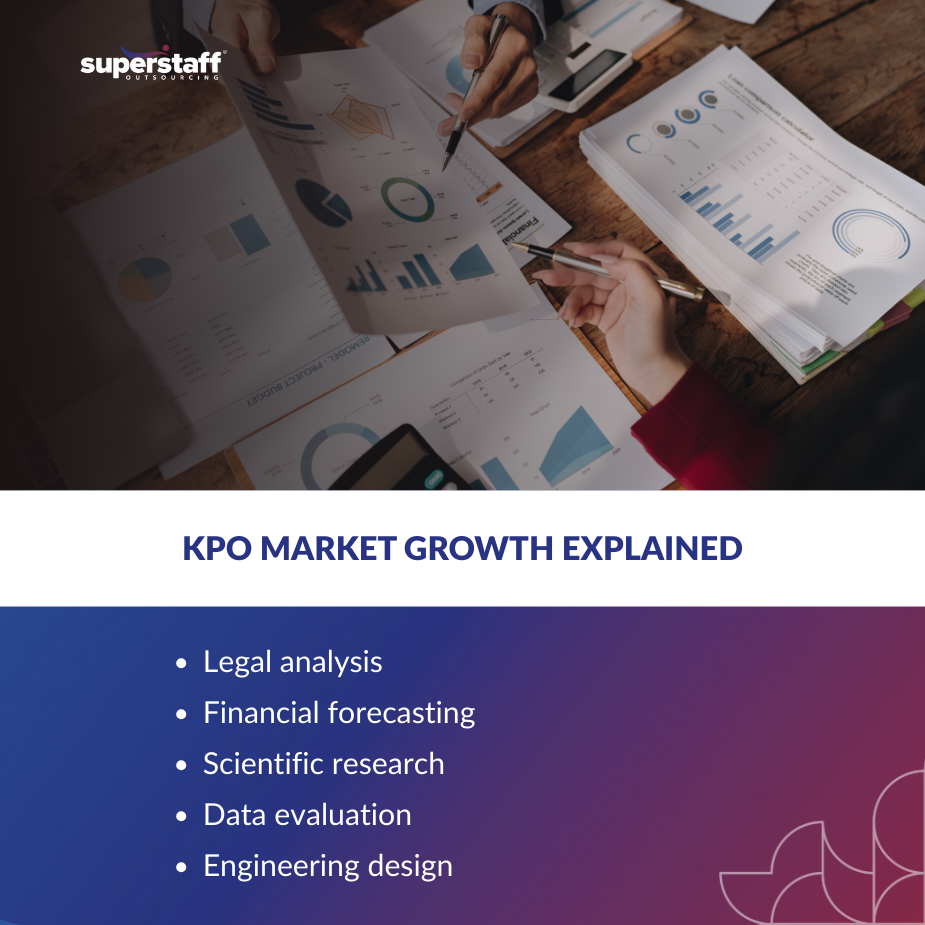
Many companies want expert help, but not every business can hire full-time specialists. Whether it’s legal work, financial analysis, or research, building an in-house team takes time and money.
That’s why more companies are exploring Knowledge Process Outsourcing (KPO). Instead of managing everything internally, businesses can now access expert services from external partners who specialize in high-level work.
The KPO market growth continues to accelerate as companies look for smart, cost-effective ways to tap into global talent. This article will explain what KPO is, why it’s growing, and how different industries are using it to gain expert support and stay competitive.

What Is Knowledge Process Outsourcing (KPO)?
Knowledge Process Outsourcing (KPO) is a type of outsourcing that focuses on tasks that require deep knowledge, specific training, or professional certification. It goes beyond simple support work by offering expert services across different fields.
Some examples of KPO services include:
- Legal research and contract review
- Financial modeling and investment reports
- Scientific or medical research
- Data analysis and reporting
- Engineering and product design
These tasks are handled by professionals with expertise in law, finance, science, or technology. This sets KPO apart from Business Process Outsourcing (BPO), which typically involves routine tasks like customer service or data entry.
As industries shift toward data-driven decisions and specialized work, the KPO market growth is becoming more visible across different sectors.
Why the KPO Market Growth Is Accelerating
More companies are turning to KPO because they want expert help without the high cost of hiring full-time staff. Here are a few reasons why the KPO market growth continues across the world:
1. Talent Is Hard to Find Locally
Many businesses struggle to hire specialists in their local market, especially for roles that require niche expertise. KPO helps solve this problem by giving companies access to a wider global talent pool, allowing them to find professionals with the right skills no matter where they are based.
2. Cost Savings
Hiring experts as full-time staff members can be costly, especially for small and growing companies. KPO offers a more affordable option by reducing labor costs and eliminating the need for long and expensive training processes.
3. Time Efficiency
KPO providers already have the skills, tools, and experience to start working immediately. This allows businesses to save time by outsourcing complex tasks that would otherwise take weeks or months to manage internally.
4. Focus on Core Work
When expert-level tasks are outsourced, internal teams can concentrate on their core responsibilities. This focus helps improve performance across departments and keeps the business moving forward without distraction.
The steady demand for expert support is one of the main reasons behind the strong KPO market growth. Businesses in many industries are now shifting their focus from building everything in-house to building the right partnerships.
Who’s Using KPO and How?
KPO services are being used across industries that rely on professional insights and accurate data. Here’s a closer look at how some sectors are applying it:
-
Finance
In the finance sector, financial research outsourcing is becoming more common. Companies use KPO for services such as risk analysis, equity research, financial forecasting, and investment reporting. These tasks require specialized skills, and outsourcing helps firms gain high-quality insights without expanding their internal teams.
-
Healthcare
In healthcare, KPO providers support tasks like clinical trial data management, research assistance, and medical billing. These services help healthcare companies reduce operational costs and focus more on patient care by minimizing the time spent on administrative or analytical work.
-
Legal
Legal teams often outsource contract reviews, document drafting, and compliance tracking. These high-skill tasks are handled by trained legal professionals, allowing internal staff to dedicate more time to case strategy and client services.
-
Marketing
Marketing departments rely on KPO teams for data-driven research, SEO planning, and content strategy. By outsourcing these specialized tasks, businesses gain better insights into customer behavior and can create stronger, more effective campaigns.
As more industries turn to expert support for high-level work, the KPO market growth continues to rise, showing that this model is becoming a standard business strategy across sectors.
What to Consider Before Choosing a KPO Provider
Outsourcing knowledge work can offer strong results, but it requires thoughtful planning. Here are a few steps to follow before starting:
1. Define the Scope
- Be clear about what tasks you want to outsource.
- Create a list of services and expected outcomes.
2. Check Credentials
- Choose providers with a proven track record and the right qualifications.
- Ask for case studies or client references.
3. Review Security Measures
- Make sure your provider can meet your data privacy and confidentiality standards.
- Sign non-disclosure agreements if needed.
4. Discuss Communication
- Regular updates and clear communication help avoid delays or errors.
- Set up weekly or monthly check-ins.
Planning ahead ensures that your business gets the full benefit of KPO without setbacks. Clear goals, good partners, and solid communication are key.
5 Benefits of Knowledge Process Outsourcing for Startups and Growing Companies
The KPO market growth isn’t only supporting large corporations. Small and medium-sized businesses, including startups, are now using it to compete on a higher level by gaining access to professional support that would otherwise be out of reach.
1. Access to Experts
Startups can tap into expert talent without building full departments from scratch. This gives them the ability to handle complex work, such as research, analysis, or compliance, with the same level of skill as larger organizations.
2. Lower Costs
KPO reduces the need for long-term salaries and training expenses that come with hiring full-time specialists. Instead of committing to costly hires, startups can get the same quality of work at a fraction of the price.
3. Flexibility
Companies can scale their outsourced team up or down depending on project needs and available budgets. This flexible setup is ideal for startups that experience changes in workload as they grow.
4. Faster Turnaround
KPO providers often deliver work faster than newly formed internal teams because they already have the tools, systems, and experience in place. This means projects can move forward without delays caused by onboarding or training.
5. Better Quality
With trained specialists handling the work, results are more accurate and dependable. Startups benefit from expert-level outputs that meet industry standards without building in-house expertise first.
The benefits of knowledge process outsourcing for startups are especially strong because KPO services allows smaller companies to operate like larger firms—accessing skills, speed, and accuracy—without taking on high overhead costs. This advantage plays a major role in ongoing KPO market growth worldwide.
Why the KPO Market Growth Will Continue
The trend toward outsourcing expert work is not slowing down. As more companies look for smart ways to access specialized skills, the KPO market growth will remain strong.
More industries now realize that expert knowledge doesn’t need to be in-house to be effective. Whether it’s legal work, financial research outsourcing, or scientific analysis, KPO makes it possible to access skilled professionals worldwide.
The combination of quality, flexibility, and cost savings explains why companies are choosing KPO over traditional hiring models. As long as knowledge remains valuable, businesses will continue turning to outsourcing to fill that gap.
Need expert support without building a full team? SuperStaff offers flexible KPO services tailored to your business needs. Whether you need help with financial research outsourcing, legal support, or data analysis, we connect you with professionals who deliver real results.
The growth of the KPO market shows that this model works. Let SuperStaff help you take the next step with the right expert support—on your terms.
Talk to us today and see how outsourcing expert work can help your business grow.






